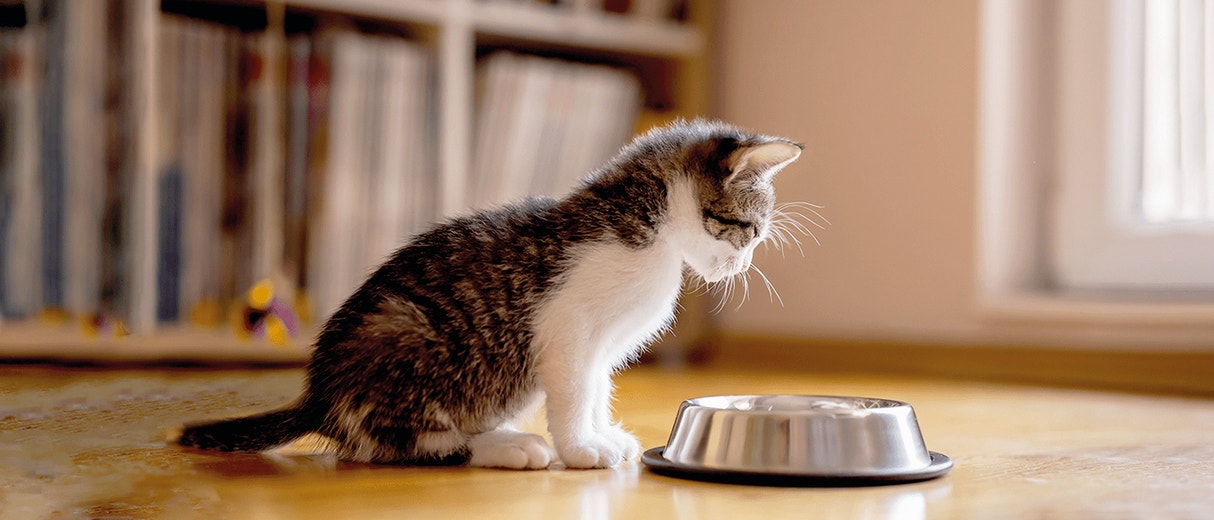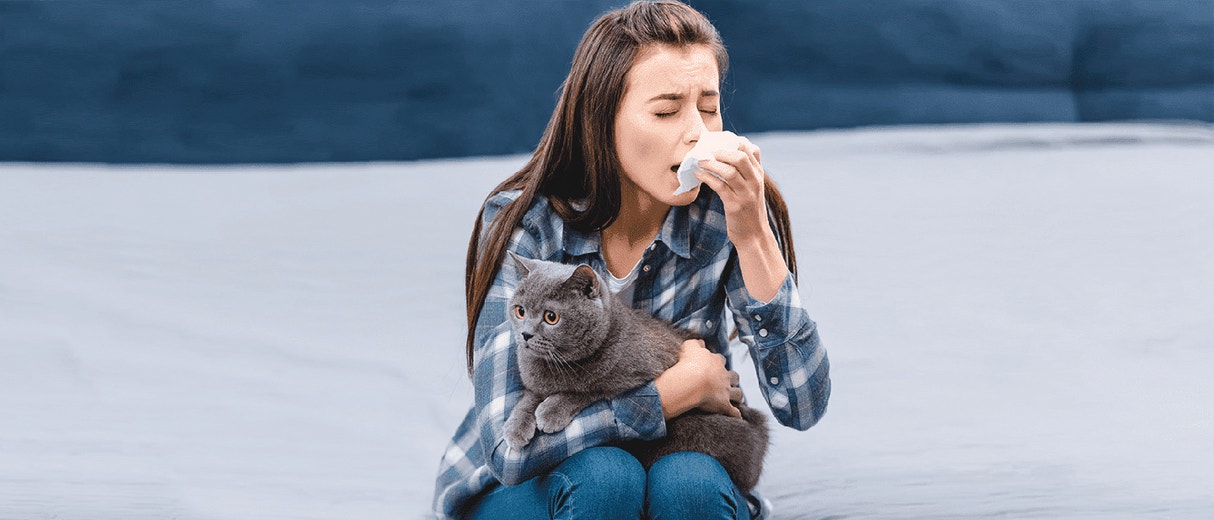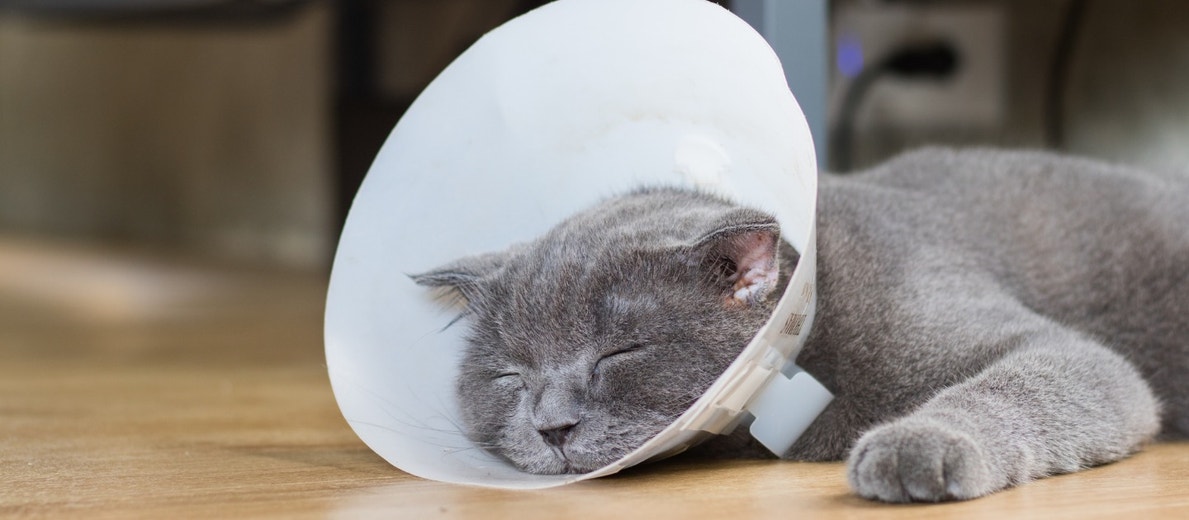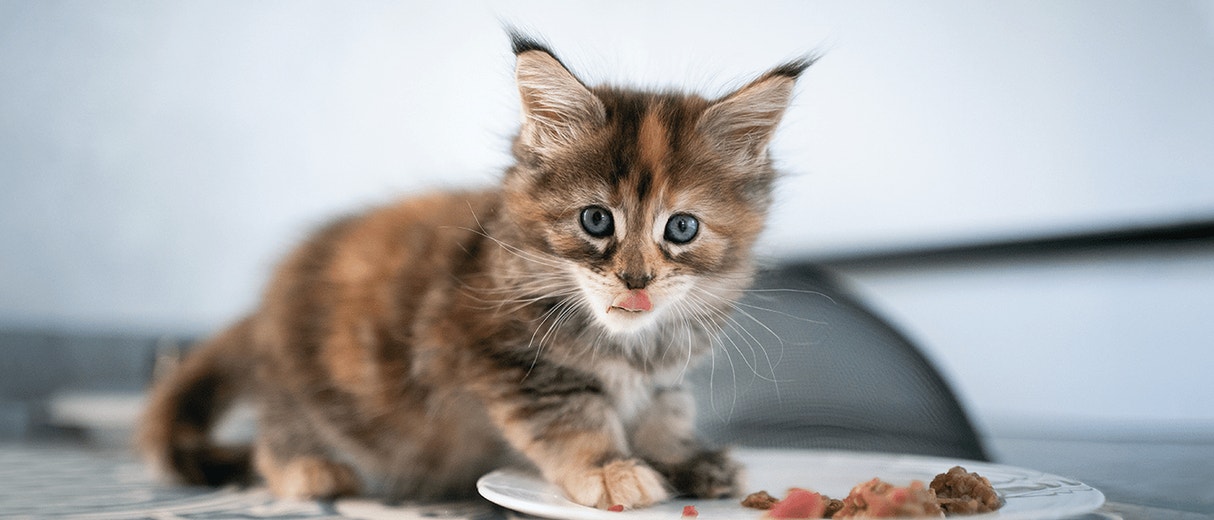
Diarrhea & Constipation in Kitten: Kitten Upset Stomach
Just like yours, your kitten’s digestive system converts the food she eats to energy. If she’s poorly, her tummy may be affected, with common problems being diarrhoea and constipation. If your kitten does have either of these symptoms, then it’s a good idea to get your vet to check her out.
Kitten Vomiting
If you see your kitten vomiting occasionally there’s probably nothing to worry about. Like all cats, she’ll do this quite naturally in order to protect herself from harmful substances. However, if your kitten is vomiting regularly, and you’re concerned for her health, then take her to the vet.
Kitten Diarrhoea
Diarrhoea can be caused by changing your kitten’s food, overfeeding, or by an infection. Your kitten should have a bowel movement at least once a day, so watch out for any changes. Diarrhoea causes dehydration, which isn’t good for your kitten. Speak to your vet for advice and reassurance.
Causes
- Intestinal parasites or worms
- Hyperthyroidism
- Change of food and diet
- Pancreatic insufficiency
- Inflammatory bowel disease
- Cancer
- Colitis
Symptoms
The biggest tell-tale symptoms of diarrhoea in kittens include:
- Frequent defecation (at least 2-3 times more than normal)
- More than normal water in the stool
- Accidental defecation outside litter boxes
- Abdominal pain
- Straining when defecating
Usually, in most cases, the diarrhoea in kittens will go away on its own in a few days. All you need to do is ensure your fur kid stays hydrated and keep it under observation. However, take your furball to a vet immediately if the diarrhoea lasts long, or if the stool is bloody or black, or if the diarrhoea is accompanied by fever, kitten vomiting and diarrhoea, lethargy, or loss of appetite.
Treatment
The treatment of diarrhoea for your fur baby would depend on the cause. There are two ways to go about treating diarrhoea in cats, and they are:
Normal treatment -
Depending on the cause, your vet will prescribe medications to stop the diarrhoea. Medications like metronidazole or prednisolone are given to control inflammation. Deworming and probiotics might also be given. For kitten with upset stomach caused by inflammatory bowel disease or colitis, a diet change can be advised by your vet.
Home remedies
You can try the following home remedies before consulting a vet, if your feline buddy only have mild diarrhoea symptoms or alongside continuing the prescription drugs:
- Change their diet
If you notice upset stomach in your kitty right after introducing a new food, stop giving it at once and go back to the food it was used to consuming. Remember whenever you introduce new food to your fur baby, always transition slowly over a week to allow for the cat digestive system to adjust. Follow this simple chart for proper transition and to reduce the chances of diarrhoea caused by a change of diet: Days 1 & 2: ¾ current food and ¼ new food Days 3 & 4: ½ current food and ½ new food Days 5, 6, & 7: ¼ current food and ¾ new food Days 8 onwards: only new food
If their regular food is causing the diarrhoea, ensure they are getting the proper nutrients. Nutrient requirements of cats change with age and not getting proper nutrition can mess up their digestive system.
- Keep them hydrated
Make sure their water bowl is filled with clean water at all times. You can also give them broth or canned wet food to ensure they receive enough fluid.
- Clean their litterbox
Keep their litterbox clean at all times for the benefit of your own as well as the cat’s health.
- Allow them to rest
Let your cat rest as much as possible by giving them a safe, quiet, and stress-free environment and not getting them excited with toys or plays.
Kitten Constipation
If you see your kitten straining while she’s in the litter box, she may be constipated. Like diarrhoea, constipation might be the result of a change in diet, overfeeding or some kind of infection. If the symptoms continue for more than 48 hours, it’s best to speak to your vet.
Causes
Constipation in cats can be caused by a number of reasons, such as:
- Overly grooming themselves resulting in too much hair in the digestive tract that stops the stool from passing
- Not enough fibre-intake
- Something lodged in a colon such as a bone
- Kidney diseases
- Spine problems
- Tumours inside the colon blocking the passageway
- Feline megacolon - a disease caused by the colon becoming enlarged with the muscles failing to squeeze out the faeces and resulting in stool build-up
Symptoms
You can tell that you little munchkin is having constipation, if you notice the following:
- Hard and dry stools
- Less than normal passing of stools or not passing stools at all
- Crying when trying to pass stool
- A tense abdomen and hunched posture
If your cat hasn’t defecated in 48 to 72 hours and if the above-mentioned symptoms are accompanied by vomiting, nausea, loss of appetite, or any other unusual behaviour, make sure you contact your vet immediately. Kitten constipation can be a sign for other underlying health condition which needs to be diagnosed and treated as soon as possible.
Treatment
The treatment for constipation in your fur kiddo will depend on the cause. There are two ways to go about treating constipation in cats, they are:
Normal treatment
For mild cases, your vet might suggest diet and lifestyle changes such as giving them fibre-rich foods and increasing water intake. Medications along with laxative and probiotics might also be prescribed. Hairball medications can also prove to be effective if hair accumulation is causing the problem. However, if the constipation is severe and your cat hasn’t passed stool for several days, your vet might have to do a de-obstipation, which is manually removing the faeces from the colon. In case your cat has megacolon, it might also need to undergo surgery.
Home remedies
If your fur baby has mild constipation, you can try the following home remedies to cure the problem:
- Change food
Have you recently switched your furry friend’s food? If yes, then most probably the new food is the reason behind the constipation. Try switching back to the old diet.
- Increase water intake
encourage your pet to drink more water. Give it broth and wet food instead of dry food to increase fluid intake.
- Give fibre-rich food
Does the food your kitty eat has enough fibre as per their daily requirement? Make sure they eat fibre-rich food.
- Include probiotics in the diet
If your cat food doesn’t contain probiotics, add them as supplements to improve your kitty’s gut health and digestive system.
FAQs for Cat's Upset Stomach
-
How often should you feed a kitten?
Kittens should be fed frequently in small amounts throughout the day. For kittens over 2 months old, kitten food can be given 4 to 5 times a day. From 6 to 12 months old, the number of meals can be reduced to 2 to 4 times a day
What should your kitten drink?
It is important to keep your kitten hydrated, especially if you are feeding them dry food. Kittens do not need milk once they have been weaned off. Instead of milk, it is best to give them clean and fresh water to drink. Ensure that your kitten has fresh water to drink wherever and whenever they need it. Generally, you should start giving them water to drink once you have started giving them a little solid food. Give them fresh, clean water in a shallow bowl. It is best to place it in places where they like to relax. You should not place it in the same place as where they eat.
When should you switch kittens to kitten food?
Besides baby cat food, kittens can try small bites of solid food to familiarise themselves with it. At 2 months old, they should be weaned off mother’s milk and switch from baby cat food to wet kitten food.
Foods to avoid
Although you may have good intentions, some human foods are not recommended for cats. Human foods are high in calories, and lack the essential nutrients that cats need. Some of the food that we eat can be very harmful to cats. This includes onions and garlic, milk and dairy products, alcohol, grapes and raisins, caffeine, chocolate, raw eggs and meats, and fat trimmings and bones.
Can kittens eat human food?
Feeding kittens human food can have detrimental effects as kittens have very different dietary requirements compared to humans. Kittens require about 40 essential nutrients to deliver complete nutrition, whether the food is dry, wet, or semi-moist.
Since kittens are carnivores, animal meat is one of the safest human foods to give them as they rely on nutrients found in animal products. There are 11 essential amino acids for kittens that must be supplied in their diet:
- Arginine
- Histidine
- Isoleucine
- Leucine
- Lysine
- Methionine
- Phenylalanine
- Taurine
- Threonine
- Tryptophan
- Valine
These essential amino acids, along with other essential nutrients, are best supplied by animal meat and organs (liver, heart, and kidney). Fish, meat, and poultry are the best choices as they provide all the protein and essential nutrients your kitten needs. It can be minced, ground, or blended so your kitten can eat it easily. However, it is not recommended to feed your kitten too much fish such as tuna and salmon. These fish contain high levels of mercury and can cause mercury poisoning (dizziness, loss of balance and coordination). Make sure everything is cooked thoroughly to destroy any bacteria or parasites before feeding your kitten.
Besides meat, kittens also eat plants occasionally for roughage or fibre. The recommended vegetables for your kitten are carrots, broccoli, and spinach that have been steamed or boiled. These vegetables are also a source for vitamins and minerals. Similarly, make sure that all vegetables are washed and cleaned thoroughly before cooking. Avoid feeding your kitten raw vegetables as it cannot be digested and can cause digestion problems.
How to feed a kitten up to 4 weeks old
As kittens grow, they require different types of food and different ways of feeding to support its growth and development. When kittens are born, they obtain all the nutrition they need from their mother’s milk, which is the best baby cat food. It is important to ensure that your kittens and the mother cat are safe and away from any disturbances. This allows them to feed peacefully. Keep your kittens warm and place them in a comfortable position on their stomach as they feed. After 4 weeks, they should be weaned off and introduced to food for kittens.
How to feed a kitten from 4 weeks to 4 months old
Once your kitten reaches 4 weeks old, it may start showing an interest in solid food! You can start to gradually wean off your kitten and introduce them to a bit of solid kitten food. Dry kitten food can be mixed with water so that it is soft enough for kittens to eat easily. Wet kitten food can also be used. Place the food in a shallow dish or bowl to get them used to good eating habits. It is essential to learn how to feed a kitten properly with the right food to help them grow happily and healthily.
How to make kitten food
Homemade kitten food that is prepared using natural and fresh ingredients is a great way to introduce your kitten to different tastes and textures. This helps in their growth and development. Since kittens are carnivores, they can eat most kinds of meat like chicken, beef, and fish that have been minced or ground and then cooked.
Kittens require 4 times more protein than humans. In order to fulfil this need, homemade kitten food needs to contain at least 70 g of protein per 1000 kcal of metabolisable energy (ME). This is equal to roughly 220 g of chicken meat, or 320 g of fish. The meat should be cooked, either by steaming or boiling it. However, if you don’t know how to make kitten food, or don’t have the time to - don’t worry! Whiskas® kitten food is the best kitten food that covers all of your kitten’s nutritional needs in a wide range of delicious flavours
What should you feed a fussy kitten?
Many kittens have a preference for certain textures and flavours. Try to feed your kitten a mixture of wet and dry kitten food. You can also try the wide variety of Whiskas® kitten food to find your kitten’s favourite food.
What is the ideal diet for a kitten?
Kittens need a complete diet with the right balance of proteins, essential fatty acids, carbohydrates, minerals and vitamins. Whiskas® offers a wide range of kitten food with all the nutrition they need.
What food should you feed a newborn kitten?
Mother’s milk is the best kitten food (below 2 months) as it contains DHA which helps in the early stages of development. The colostrum is also very high in protein and helps to strengthen a kitten’s immune system.
What do I need to know after a cat vaccine?
As important as cat vaccinations are, it can leave your furry munchkin distressed, anxious and confused. To help your cat once it has been vaccinated, you can provide them with a warm, cosy bed to rest and recover, ensure they have easy access to food and water to stay well-fed and hydrated, and avoid getting them excited or riled up for nothing. With sufficient rest, love and care, your cat can get over the distress of vaccination in no time!
Is a vaccine necessary for cats?
Most cats have a higher resistance to diseases. However, in their infancy, cats can often be susceptible to various diseases, and to avoid any severe health risks that can prove fatal, certain preventive measures must be adopted. Cat vaccinations are one such measure that can significantly lower the chances of your furry pal getting sick. In addition, vaccinations are also important as they play a vital role in preventing the transmission of viruses from one cat to another, or to humans.
What are the important vaccines for cats?
To avoid any severe health complications, most cats are required to receive cat injections with core vaccines, including rabies, feline rhinotracheitis, feline calicivirus, and feline panleukopenia vaccines. The other non-core vaccinations your cat might require are the feline leukemia virus, chlamydophila felis, and bordetella bronchiseptica vaccinations, as well as cat booster vaccines.
What is a 3-in-1 vaccine for cats?
Of the cat injections that are recommended for cats, the 3-in-1 vaccine is one of the most essential vaccines that protect your cute furball against infectious diseases. The 3-in-1 vaccine, as the name suggests, is responsible for safeguarding against three diseases, namely - feline calicivirus, feline panleukopenia and feline viral rhinotracheitis. The 3-in-1 vaccine in cats is usually administered through injections.
What vaccines does a cat need?
Cats often need vaccines including rabies, tricat and tetracat, as well as the vaccines required for specific diseases. Other than the panleukopenia (or feline distemper), feline calicivirus and feline viral rhinotracheitis, your little pal might also require additional vaccination shots to prevent common diseases like feline leukaemia and bordetella. The purpose of cat vaccine is to help develop a stronger immune system and ward off potentially harmful diseases.
How long can a cat go without pooping after diarrhoea?
If the constipation is mild, regardless of after diarrhoea or in general, it should be fine. But if your cat doesn’t pass faeces for 48-72 hours, consult a vet.
Can a cat have diarrhoea with bowel obstruction?
Diarrhoea is one of the symptoms of intestinal bowel obstruction. Partial obstruction causes diarrhoea while complete obstruction causes inability to pass stool and gas. It is an extremely serious condition and requires immediate medical attention.
How long does it take for a cat to get Un-constipated?
Depending on the cause, it can take anything between a few days to 12 weeks. Usually, a diet change takes time to show effect, whereas medications can give quick relief.
Can a cat be constipated and still have diarrhoea?
When a cat has megacolon, they can have stool build-up in their colon causing constipation. However, sometime your fur kiddos can leak a little lose stool from around the hard faeces, which an be misinterpreted as diarrhoea. If you notice constipation and diarrhoea at the same time in your furball, take it to a vet without ado.
What are healthy foods for cats with constipation?
Cat food rich in fibres and probiotics can be good for cats with constipation. Also, if your cat has constipation, feed it wet food instead of dry food as that will help increase their water intake.
Does neutering calm a kitten down?
Spaying female kittens can reduce their libido or sex drive. Without adequate sex drive, the female cat is unlikely to respond to mating calls or look for potential mates in heat. So, neutering can calm down female kittens, making them more affectionate and loving.
What happens if you neuter a kitten too early?
Though early cat neutering can be helpful in population control and avoiding unwanted litters, if carried out at a drastically young age, neutering can delay the closure of bone plates, affecting the kitten’s growth. Feline babies neutered too early also can lead to a narrower urethra, increasing the risks of urinary blockages.
Do kittens change after being neutered?
Behaviours, such as their personality, training, and preferences are unlikely to change in cats after neuter. Neutering male fur babies cut them off from the source of testosterone, the male sex hormone, which can result in a change in behaviours that are driven by the sex hormones, such as roaming and aggression.
What is the best age to neuter a male kitten?
Spaying and neutering for cats are best done between the age of 5 to 6 months, the perfect age to neuter cat. However, no two cats are alike, so it is always wiser to consult your veterinarian and seek professional advice on when to get your cat neutered or spayed. Make sure your kitten receives the after-neuter care cat it deserves following the procedure.
What age do kittens drink water?
Newborn kittens at their infancy do not need to be given any additional water as they are entirely dependent on their mother's milk for nutrition and moisture. However, kittens over 4 weeks of age must drink at least 70 ml water regularly.
Do 4 week old kittens eat solid food?
Yes, kittens at 4 weeks of age must be gradually transitioned to solid food. However, dry cat food or crunchy cat treats might not be the best idea. Instead, try feeding your weaning kitten home cooked meals or wet cat food in smaller bite-sized portions.
What do you feed a 4 week old kitten?
Kittens aged 4 weeks or more should be prepared for the transitive process of weaning, and must be gradually introduced to solid food. Home cooked meals with low salt, oil and spices, as well as commercially available wet cat food are perfect for weaning kittens.
How do you introduce solid food to kittens?
Wondering when should kittens be weaned? It is unwise to suddenly introduce your weaning kitten to solid food. Instead, your little furball must undergo a gradual transition process of switching from milk to solid food, known as weaning, and is a crucial event in a feline's life.
How much to feed a kitten?
Generally, you should feed a kitten until its belly feels full. For newborn kittens, it is recommended to feed kittens 4 to 5 pouches of Whiskas® wet kitten food.
How do I store kitten food?
Bags of dry kitten and cat food should be stored in a cool, dry place. For wet kitten food that has been opened, store it in an airtight container and place it in the refrigerator.
How do I feed a fussy kitten?
Many kittens have a preference for certain textures and flavours. Try to feed your kitten a mixture of wet and dry kitten food. You can also try the wide variety of Whiskas® kitten food to find your kitten’s favourite food.
How often to feed kittens?
It is recommended to feed kittens twice a day, either with dry food, wet food, or both. You can follow our feeding guide that can be found on every Whiskas® kitten food bag.
What do kittens eat?
Most first-time owners may be wondering; what do kittens eat? From birth to 4 weeks old, kittens will have milk from their mothers. After that, they can start trying solid food. If you’re wondering on how to feed a kitten during this time, consider mixing some dry food with kitten milk or water, or use wet food so they can eat it easily.
See More Articles Like This




